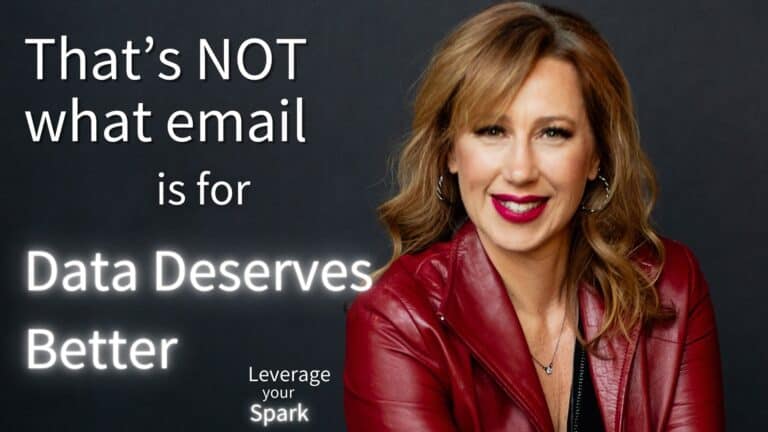That’s NOT what email is for: Your data deserves better

Do your monthly reports arrive in your inbox? That’s NOT what email is for! After all, your data deserves better. Right now, most people are using email for far too many things. I get it; email is the de facto online business communication. But that’s no reason to let it continue.
Business intelligence decisions require data. And by using your email for data, you may have a potential issue with the third simple machine of business: analytics.
Listen in to Season 1: Episode 7
The Problem with Receiving Data via Email
Tell me if this sounds familiar: Your monthly reports arrive via email. You really do want to look at them, but [insert urgent thing that also arrives in your inbox].
Then the day is over. Then a week passes, and you just never get to reviewing that data because you know, business owner to business owner, it just never feels urgent.
This all results in you flat-out ignoring the data in those reports. And that’s really an insult to everything you’ve built in your business.
Why You Should Care about Reports
Reports get a bad rap. Personally, I had a lot of healing to do around the trauma of planning and reporting from my days in corporate. In those environments, those reports felt more like a stick than a treasure map.
But that is exactly what reports can be: treasure maps. Sometimes they tell you that you’re on the right track. Other times, they tell you that you are far from what you seek. And that’s when we need them the MOST! When the numbers are bad is when reports are critical tools.
What can you do differently to care about (and actually review) reports? First, make a CEO date with yourself (shout out to Racheal Cook; this is part of her framework).
Put a date and time on the calendar—one that’s non-negotiable—where you sit down to review the most important data and metrics in your business. You’ll thank me and Racheal later.
Second, reports don’t belong in your email! So stop sending them there. Instead, you can put the links to those reports directly in your calendar invite. Or put the links in a document. You can actually put the reports directly into Google Drive (or whatever cloud storage you use).
Pro tip here: Save all your reports to Google Drive. Put that Google Drive link into your calendar invite. Get it done. So then what? What does life look like on the other side?
What Happens When You Review Those Reports?
When you make time to review your reports, you’re actually using the data. And moving your business forward because you’re no longer ignoring that critical information that would otherwise just be languishing in your inbox.
Whether it was what you were hoping to see or not, reports contain the critical data you need to make intelligent decisions for your business and to best serve your clients.
One more note here: Something I’ve noticed when working with clients and reports is that reports are a time for discovery, not expectations. Go into your reports being curious about what is happening and you’ll get a lot more from them.
How Have You Used Data to Benefit Your Business?
I would love to hear how you’ve benefited from learning more about your business data and reviewing reports. Have you successfully moved those reports out of your inbox? Hit me up on social and share your story!

